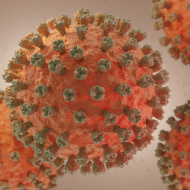Common cold virus originated in camels, study shows
"Our current study gives us a warning sign regarding the risk of a MERS pandemic - because MERS could perhaps do what HCoV-229E did."
Scientists concerned about the potential for a MERS pandemic
New research suggests that one of the four human coronaviruses that cause common colds originated in camels.
The discovery has prompted fears over a potential pandemic of Middle East respiratory syndrome (MERS), a deadly coronavirus that also originated in camels and was identified in humans for the first time in 2012.
'HCoV-229E' is one of four human coronaviruses that cause common colds. While infection with the virus is generally harmless to humans, researchers say its global spread through human-to-human transmission could now be cause for concern.
Professor Christian Drosten from the University Hospital of Bonn in Germany said: "Our current study gives us a warning sign regarding the risk of a MERS pandemic - because MERS could perhaps do what HCoV-229E did."
Led by Prof Drosten, the research team examined around 1,000 camels for coronaviruses and were surprised to find pathogens related to HCoV-229E in nearly six per cent of cases. Further analysis indicated the virus was transmitted from camels to humans.
The common cold viruses isolated from camels were also able to enter human cells through the same receptor used by HCoV-229E. However, the human immune system can protect itself against the camel viruses and further testing indicated there is no immediate risk of an epidemic in humans, as the majority of the human population has immunity.
But Prof Drosten said the MERS virus "is a strange pathogen".
"Smaller, regionally restricted outbreaks, for example in hospitals, keep occurring. Fortunately, the virus has not adapted well enough to humans, and has consequently been unable to spread globally up to now."
Based on their findings, the team say there is a need for action and they are working to develop a vaccine against MERS, which will go into clinical testing next year.







 RCVS Knowledge has welcomed Professor Peter Cockcroft as editor-in-chief for Veterinary Evidence.
RCVS Knowledge has welcomed Professor Peter Cockcroft as editor-in-chief for Veterinary Evidence. 
